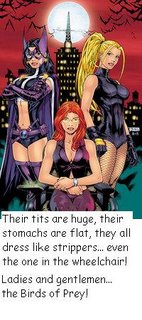
I hear (well, read, I'm talking about the Internet, here) a lot of talk lately about how badly women are exploited in superhero comics. So, let's take a look at that.
Women in superhero comics are undoubtedly portrayed unrealistically. Their physical appearances are distorted to a nearly grotesque degree, making them exaggerated visual clichés of adolescent male sex objects. Their behavior is even worse; what personalities they have are generally rudimentary or even vestigial, and the roles they occupy are always subordinate to any male superheroes, and for that matter, most other male characters, they appear with.
Throughout the history of superhero comics, female characters have played these demeaning, humiliating roles. Non super powered female supporting characters are simply there as arm candy and plot fodder – “Gosh, Superman, Lois and Lana have both been captured by Lex Luthor’s X-Androids!" This represents, essentially, the entire feminine gender reduced to the status of ongoing nuisance which the hero has to deal with, over and over again. (Lois Lane herself may very well be the epitome of the misognystic witticism "women -- can't live with 'em, can't kill 'em". In Superman's case, apparently, he can't even let her die, either.)
Super powered women, on the other hand, fall near-universally into two subordinate categories in superhero comics – The Inevitable Girl in an otherwise all male superhero team, or The Distaff Version of the Stronger Male Superhero, i.e., Captain Hero With A Boob Job. (Some characters, like the Wasp, fill both categories; she began her career as a weaker version of her senior male crimefighting partner, Ant-Man; a bit later, she also became The Inevitable Girl in the original line up of the Avengers.)
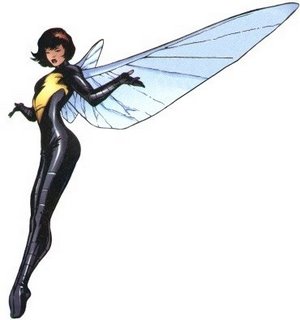
So, on the one hand, the visual portrayal of nearly all women in superhero comics is distorted and grotesque, clearly designed to fulfill the sexual fantasies of the predominantly male readership. In addition to this exaggeratedly libidinous graphic depiction, pretty much all women in comics, with super powers or without, remain in subordinate, supporting roles to stronger male characters.
It doesn’t take a master’s degree in rocket science to understand why this is now, and pretty much always has been, the norm in superhero comics – the sub-genre is entirely designed for, and largely supported by, adolescent males of all ages. To the adolescent male (whether he’s 14 years old or 44), this bizarre and absurdly unrealistic depiction of femininity represents on some very basic, emotional level the ‘ideal woman’ – always sexy, perhaps often annoying, but presenting no real problems or difficulties that the competent, dominant male in their lives can’t solve relatively easily, through straightforward confrontation with the inevitably weaker and inferior forces of obfuscatory evil.
Is this a demeaning portrayal of women in general? I wouldn’t argue it. In fact, I think you could fairly cogently make your case that it’s demeaning for everyone involved; any man who honestly believes that the first forty years of so of Lois Lane’s appearances accurately represent female behavior to any degree is pretty frickin’ stupid. Further, any man who understands that real women aren’t like Lois, but wistfully wishes they were, is beyond stupid and well into a level of emotional retardation nearly transcendent of actual human behavior… but I won’t deny that guys like that also exist... and give the rest of us a bad name, too.
But, still… I think it may be worthwhile to note at this point that, just as pornography demeans both the men AND women who appear in it, so too do comics offer an equal opportunity to both genders for exaggeration and distortion of physical appearance and psychological behaviors.
Which is to say, the men in comics don’t exactly resemble me, or any of my geek buddies, either.

Assuming that the vast slab like chests, brobdignagian shoulders and deliriously ripped musculature of comics’ super powered male mesomorphs are, to any sane or rational eye, at least as distorted and, from a realistic point of view, grotesque, as the similar and equitable anatomical exaggerations hung on all the female characters (and pointing out that the relatively few female superhero fans in the audience seem to enjoy admiring Green Lantern’s ass as much as the vastly greater number of male fans out there like to look at Power Girl’s magnificent gazongas), we’re still left with the insultingly subordinate roles female figures invariably assume in superhero comics.
So, even if the overly sexual physical caricaturing ends up being a wash, as it is just about equally applied to either gender, we're still left with how generally annoying the women in comics are, or how inferior the gender roles they tend to play are in comparison to what the guys get to do.
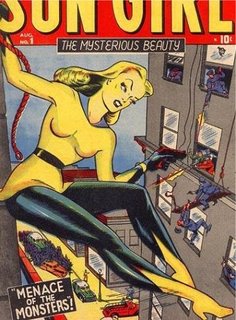
It’s also worth noting, as we move along, that the present day scarcity of superwoman in comic books does not represent how things have always been. In Comics Golden Age (circa World War II; as with the Silver Age, no two scholars can agree on an exact date range when the Golden Age began or ended) there were a plethora of super powered women in comics, few of whom were in any kind of super team and very few of whom had anything to do with male superheroes. Male superheroes were far more numerous, but still, characters like the Blonde Phantom, Phantom Lady, Black Fury, Sun Girl, Venus, and Miss America abounded in those more innocent times… along with other females more clearly derived from male predecessors, like Namora and Batwoman.
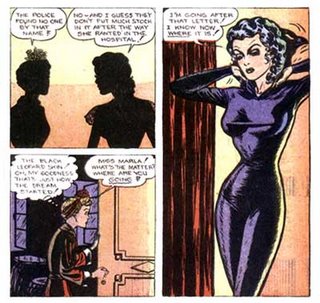
Exactly why the World War II era of comic books features so many independent superheroines, and why the post war era saw most if not all of those independent superheroines either vanish altogether, or sink into the same kind of subordinate roles supeheroines still seem mired in today, I could not tell you. It may well have something to do with the fact that in WWII, women stepped up and took over most of the predominantly male roles in both society and industry, out of necessity as the vast majority of men were serving in the Armed Forces… and this seems all the more valid as an observation when one reflects on the quick backlash against this widespread feminine liberation that occurred when the men returned to civilian life after WWII and literally forced women back into their subordinate roles as domestic helpmeets and support personnel in the work force (secretaries, waitresses, cashiers, etc).
This would seem to very closely mirrored in superhero comics, with the vast majority of superheroines simply vanishing, and those that remained (Wonder Woman and Black Canary, most noticeably) serving in turn as Inevitable Girls to the Justice Society of America, and, just to rub their noses in their post war lack of status, the team’s Recording Secretary (presumably because they were the only members lacking a penis, and thus, the only ones who could knew shorthand and could take dictation).
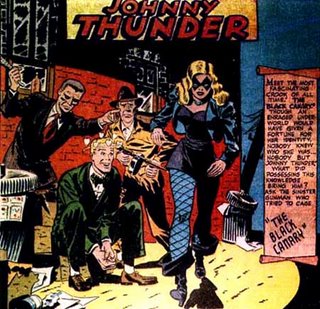
Interestingly, Wonder Woman and Black Canary remain to this day pretty much the only female survivors of comics Golden Age, making one wonder if the inevitable lesson to be derived from this is that, in the male dominated world of superhero comics, if a girl wants to survive, she has to go along to get along.
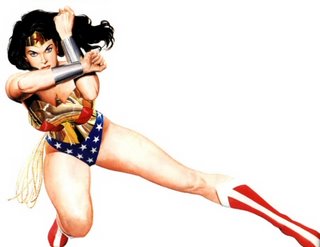
It’s also worth noting that Wonder Woman and Black Canary are, between them, decked out in two of the skimpiest and most sexually provocative costumes seen throughout the skanky, skeevy visual history of superhero comics. They’re also among the most unrealistically visually portrayed characters ever. Wonder Woman, being an artificial being given life by the gods, can, one supposes, have monumentally massive mammaries if the predominantly male deities she derives her powers from want her to have them, and somehow or other, they won’t get in the way when she power dives onto a villain from a thousand feet in the air, or twirls her magic lasso in front of her at super speed to generate a gale force wind. We can make the same statements for her ridiculous high heeled knee boots – she’s a supernatural being; if she can somehow fight while wearing these things, well, the gods move in strange and mysterious ways, and so too can their mystically animated homunculi.
No such excuses can be contrived for Black Canary, who is supposed to be one of the premiere female martial artists, acrobats, detectives, and gymnasts on the planet. Female athletes who operate routinely at this kind of superb athletic physical level do not have gigantic hooters; in point of fact, they generally have very low percentages of body fat and any breasts they may have are miniscule or nonexistent.

Beyond that, the finest Olympic level athlete in the world would have difficulty doing acrobatics, much less martial arts, in three inch heels. Ginger Rogers is famous for having done everything Fred Astaire ever did, backwards and in high heels, but I suspect even Ms. Rogers would have found it nearly impossible to vault through a warehouse window, kick a hood in the jaw, flip over his still falling body into three of his buddies, and pummel them all insensate, all while wearing three inch heeled floppy buccaneer boots and fishnet stockings – and all while trying to keep her blonde wig from falling off, too.
Do these two superchicks owe their longevity at least in part to the sheer sexiness of their costumes, however unlikely it is that they would be able to actually physically function as superheroines while dressed in, or, more likely, falling out of, such damfool outfits? Well, I wouldn't rule it out.
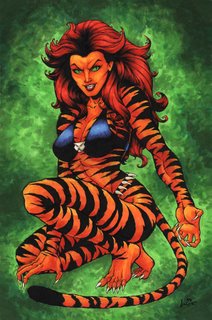
But, again, if women in comics are shown with grotesquely unrealistic anatomies, men are as well. This is an inherent part of the art form; comics, like most of our entertainment, are about fantasy projection and wish fulfillment. If we didn’t want to be those characters, or at least, hang out with them in their fictional realities for a while, we wouldn’t cough up the green for their adventures.
To sum up – superhero comics are created by a predominantly male creative group and for a predominantly male consumer base. Their essential foundations are fantasy projection and wish fulfillment. Realistic portrayals of these characters, male or female, would cause the commercial death of the subgenre. I like superhero comics, and I even like them to have a certain level of credible internal consistency and versimilitude to them, yet I have no desire to see Batman popping steroids, nor did I particularly enjoy the era where Blue Beetle had a gigantic beer belly, despite the fact that I have one myself (although, as I don’t drink alcohol, it’s more a milk and Pepsi belly, actually).
Female comics fans may continue to clamor for female characters in superhero comics with more modest mammary endowments and who do not dress like topless dancers at the beginning of a three song routine, but the commercial reality of comics precludes the modification of such details, and that’s just how that is.
If we men don’t feel our gender is being sexually exploited by its universal representation as ‘beefcake’ in these four color rags, it seems to me that female comics fans (who certainly don’t seem to mind the beefcake, either) could lighten up a little bit about the cheesecake, too. But, women tend to have different perceptions of sexuality than men do, and in this regard, we may simply have to accept that this particular sub-genre of graphic art is now and always has been predominantly created for (and by) and consumed by males… and leave it at that. Or, as I noted before, declare it a wash and put it behind us.
However, one thing we do not have to accept is the ridiculously limited, and generally subordinate, roles that female characters play in superhero comics. This isn’t the 1950s any more. If superwomen can be empowered in the 1940s, when all the men were off fighting overseas, they can certainly be re-empowered and re-liberated from demeaning, supportive, derivative gender roles in 21st Century superhero comics.
Which is to say, it’s time and past time for the creation of some super powered women in comics who aren’t either (a) simply there to cook and clean for the guys who make up the rest of their team, or (b) who aren’t simply carbon copies of stronger male characters with tits penciled in on a lightbox. And to that, I'd add (c) who don't necessarily have to prove they're as 'good as any man' by using their powers to win battles and solve problems in exactly the same way as all the super powered men do.
DC, at least, has some strong superheroines in its line up of comics, with the WONDER WOMAN and BIRDS OF PREY titles. Gail Simone’s SECRET SIX also has some fabulous women in it who are neither Inevitable Girls nor Captain Heroes With Boobs.
 And lately, with much more naturalistic writers on the character, even Power Girl – the ultimate “all I got is my hooters but damn ain’t they somethin’ boys” superwoman if ever there was one – has been displaying a lot of personality nuances never previously suspected. So there’s hope for superwomen, at the one time National Comics, anyway.
And lately, with much more naturalistic writers on the character, even Power Girl – the ultimate “all I got is my hooters but damn ain’t they somethin’ boys” superwoman if ever there was one – has been displaying a lot of personality nuances never previously suspected. So there’s hope for superwomen, at the one time National Comics, anyway.Marvel’s treatment of women in their superhero comics has always been pretty embarrassing, however. Even when Marvel's male writers try to empower women, as Chris Claremont did all through the 70s, 80s, and 90s, they tend to overreact to an embarrassing extent, creating not so much a credible and realistic portrayal of femininity within the context of superhuman serial fiction, but rather a tapestry of vastly over-aggressive, near sociopathically emotionally independent chicks-with-dicks whose personalities are all entirely interchangeable (“We don’t need no stinkin’ MEN!”) and who can generally only be told apart by carefully scrutinizing their costumes, as well as by noting the different kinds of (almost invariably phallic) weaponry they’re hauling around, in hopes of running into some godawful male they can ruthlessly thrust it into or fire it off at.
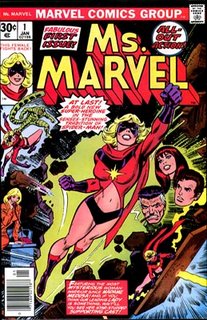
Still, all of Claremont’s ultramacho chicks were members of predominantly male teams (all his female X-Men), or were supporting characters in male superheroes’ books (the Daughters of the Dragon). The only solo superheroine title Claremont ever wrote was Ms. Marvel, and she was essentially Captain Marvel with a boob job, and her book didn’t last all that long, anyway.
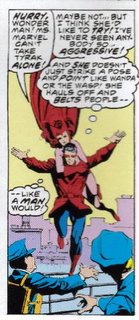
Jim Shooter, of all people, once rather famously addressed feminine roles in superhero comics in an issue of AVENGERS (#172, I'm pretty sure) where he had Wonder Man think admiringly of Ms. Marvel that she wasn’t like all the other superheroines he knew, in that she didn’t ‘just strike a pose and point’ – her confrontational style, in which she got right in there and smacked the crap out of the bad guys, was ‘like a man would!’
This seemed to lead directly to a decade or more of superheroines who were far more physically confrontational than had previously been seen in comics, women like the Huntress at DC, and the She-Hulk at Marvel, who did indeed ‘get in there and punch... just like a man’. Even Wonder Woman’s ‘fighting style’ became much more physically aggressive and confrontational after her male counterpart so openly admired Ms. Marvel's head knocking capacities.
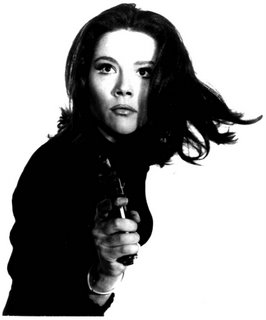 And this was all just a reflection of similar movements that had been going on in TV for ten years at that point, ever since Emma Peel started kicking brawny male attackers into submission on the British AVENGERS… a trend which culminated in the 90s ‘girl power’ shows like BUFFY THE VAMPIRE SLAYER, ALIAS, XENA, and LA FEMME NIKITA, to name a very few.
And this was all just a reflection of similar movements that had been going on in TV for ten years at that point, ever since Emma Peel started kicking brawny male attackers into submission on the British AVENGERS… a trend which culminated in the 90s ‘girl power’ shows like BUFFY THE VAMPIRE SLAYER, ALIAS, XENA, and LA FEMME NIKITA, to name a very few.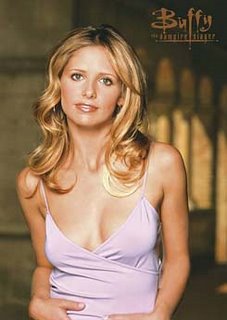
What Shooter, Joss Whedon, and most of the other male writers of these various female battlebots seems to fail to understand is that women are generally not as confrontational or violent as men are. Female superheroines, if written realistically, would be far more likely to employ their superhuman faculties in less aggressive and physically combative ways to resolve the same problems and conflicts that male superheroes invariably attempt to bludgeon insensate.
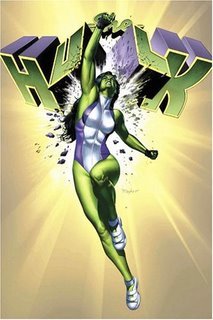 Even female superheroines with very physical abilities, such as Ms. Marvel and She-Hulk, would probably be far more likely to use their strength to manipulate their environment in such as way as to incapacitate their opponents, than they would be to simply wade in and try and beat the holy christ out of their foes. Men tend to be more violently confrontational than women largely because of male testosterone levels, and male superhumans tend to be violently confrontational to fulfill male power fantasies.
Even female superheroines with very physical abilities, such as Ms. Marvel and She-Hulk, would probably be far more likely to use their strength to manipulate their environment in such as way as to incapacitate their opponents, than they would be to simply wade in and try and beat the holy christ out of their foes. Men tend to be more violently confrontational than women largely because of male testosterone levels, and male superhumans tend to be violently confrontational to fulfill male power fantasies. All of which is to say, female superheroines in general would be far more likely to try and intellectually outwit their opponents, than they would to attempt to establish dominance on their opponents by beating them into a comatose stupor with a mid size sedan. I’m not saying there wouldn’t be exceptions to the rule – Tigra, for example, might well be more physically confrontational than a normal human woman would be, due to a more animalistic nature – but a woman as generally intelligent and rational as Carol Danvers, it would seem to me, should be far more likely to pick up a giant metal object and use it to restrain a powerful opponent, than she would be to simply fly in and club said opponent into paralytic submission.
This basic dichotomy between how men and woman approach problem solving is one most male writers seem to have little to no concept of. Thus, how male writers tend to script superheroines illustrates an essential problem with creating powerful superheroines who can exist in their own right, independent of the support of any male teammates or surrogates – unfortunately, the average male comics writer generally cannot (or will not) write them so they seem genuinely or recognizably feminine, and the average male comics fan doesn’t really like manly, aggressive, testosterone poisoned superdudes who have tits and vaginas. The same vague male discomfort with powerful women that doomed Tasha Yar early on in Star Trek Jr.'s run also augers poorly for the success of aggressive, physically powerful, extremely violent superwomen.
If we’re going to show some liberated, powerful, realistically portrayed superheroines in superhero comics, we have to find a way to make these characters appeal to female readers – and not just the female readers we already have in superhero comics, but to a vastly expanded audience that would include new female readers, as well. We can't simply create powerful female characters who are little more than clones of powerful male characters, when those powerful male characters primarily resolve conflicts through violence. The dynamic doesn't work well for women; it tends to make them unattractive to most of their target demographic, male or female. We have to find a different model for the modern superheroine, if she is giong to have any commercial success.
Marvel, unfortunately, seems locked into the extremely confrontational, good vs. bad, knock everybody through a building, pick up the car and HIT him with it style that Jack Kirby perfected forty years ago. And locked into it as they are, they don't seem to be able to do anything else with their characters, even their few female ones. There's no reason, for example, why we couldn't have a sorcerer supreme who is a woman, or a female scientific genius who has equipped herself with an array of futuristic inventions of her own creation, or a distaff star-soarer with cosmic awareness -- however, it just never seems to occur to Marvel's editors, or writers, that a woman can not only fulfill those roles just as well as a man, but perhaps even better.
In point of fact, neither Marvel nor DC has a single female scientific genius that I can think of... and given the number of male scientific geniuses in both superhero communities, this strikes me as being a really rather embarrassing lack.
DC, at least, seems to have hit on one approach to creating better superheroines – hire talented female writers to write good, credible, plausibly feminine superheroines. To this I’d add, a few talented female comics artists might be welcome additions to superhero comics, as well… although again, I’d caution; if said female writers and artists go nuts and start depicting their superheroines extremely realistically, in both their behavior and in their appearance, a lot of the escapist appeal of the superheroic continuum is going to be lost.
This may not be a terribly bad thing. It could simply mean that a comic like BIRDS OF PREY would no longer find a predominantly male audience, assuming that all the characters had more realistic measurements, the Huntress stopped dressing like a ho, and they all spent more time gossiping about who is dating who in the League and the Society and the Titans and what happened last night on GILMORE GIRLS, and using their brains to win battles instead of their martial arts prowess (something the character of Oracle does pretty much 24/7 now, anyway... but only because she's paralyzed from the waist down, and therefore, no longer can go out and kick the living bejesus out of the bad guys, the way she did when she was Batgirl).
However, if that were to happen, the theoretical title would need far more support than the current crop of female superhero comics fans could provide; or, rather, it would need to dramatically expand that female superhero comics fanbase.
For myself, I simply enjoy good, nuanced, credible characterization. Having recently read Gail Simone’s first BIRDS OF PREY graphic collection, I found, as usual, that Simone is a terrific writer, but I also, for maybe the first time since I read Alan Brennert’s brilliant Secret Origin of the character way back in 1986, found myself really believing in Black Canary as a person. What did it? Well, Simone had Canary and Huntress exchanging dialogue about the rigorous diets they had to stay on to maintain their figures – something that would have to be true of most superheroines, but that just never seems to occur to male writers – and, even more credibly, at one point Black Canary talked about how she occasionally feels all bloated and puffy while out on a case with the JSA. Again, this isn’t the sort of thing male comics writers tend to be knowledgeable of, but it immediately made Dinah much more ‘real’ for me.
So, to the extent that a female comics writer can make female comics characters more credible, I’m all in favor of it – as long as she can write male comics characters well, too. On the other hand, if Norah Ephron started writing JSA, I’d have no interest in the book; Ephron may write her female characters well, but anyone who thinks that (a) guys really want to nail every chick in the world, even the homely ones (as she had Billy Crystal state in WHEN HARRY MET SALLY) or that guys cry at the ending of THE DIRTY DOZEN (a completely retarded bit of male stereotyping she put in Tom Hanks’ mouth in SLEEPLESS IN SEATTLE) shouldn’t ever be allowed to write any male character I care about.
As for the rest of it, though, well, superhero comics are inherently unrealistic, and that’s part of their charm. They are also, at least right now, a genre created, consumed, and supported almost entirely by males. Until that changes, I wouldn’t expect to see anything else change… and as a male myself, well, the only change I’m ever in favor of is better writing. But, hey, I like the good girl art as much as anyone else… and I really can’t see anything wrong with that, either.


Not really my area of expertise, but just wanted to note that any writing that portrays strong, smart women is a plus in my Mother of Three Daughters' book. That certainly includes comics.
ReplyDeleteNice piece. I especially like the recent updates...;)
Wow. Just, wow.
ReplyDeleteInsightful as ever.
What Shooter, Joss Whedon, and most of the other male writers of these various female battlebots seems to fail to understand is that women are generally not as confrontational or violent as men are.
ReplyDeleteI think you are forgetting something. To quote Steven Goldberg (from Why Men Rule). "If we expect exceptions even when the charactersitic in question is almost purely hereditary, we can certainly expect them for a characteristic, like dominance tendency, which is determined not only by physiological factors, but by non-physiological ones (like early familial experiences) as well." The fact that men, as a gender, tend more toward dominance than women, as a gender, and the fact that this holds cross culturally, says nothing about any specific, individual woman.
The dominance ranges of the two sexes overlap, so there are plenty of females who're more dominant than the average male. The biggest difference is between the extremes, where there is the smallest population, if you follow.
To illustrate - While there are more male math geniuses than female, and past a certain point the only geniuses are male, that point hits somewhere well past the genius level, and geniuses only include the upper two percent of the population. (Technically, there are also more male morons, as well, but, again, this is only pertinent at the extreme end of things where the bell curve is nearly flat.)
Even though the male and female averages hit at different points, those points are close enough and the bell curves similar enough that most people, male and female, are in the area of overlap. A female math genius is smarter than most men, just as she is smarter than most women, and there are nearly as many female geniuses as male. By the same token, I suspect many women are far more dominance oriented than the average male.
So I, as a woman, may be less dominant than the most dominant males - but I can still be more dominant than most males I deal with. I can still identify with a strong woman, a super heroine, who doesn't hesitate to use the power she's got. And so can a lot of other women, women who, like me, enjoy comics.
I also think you're conflating the male tendency toward dominance and status seeking with the human tendency toward using force, coercion, and violence. Men are not so violent (nor women so peaceful) as you imply. As Dave Grossman points out in On Killing, even most men who've been given the job of killing (i.e., soldiers) have historically refused to do so - even when their honor is on the line and their lives are at risk. Barring serious conditioning, most men who are expected to kill or act violent come up with strategies to fake it rather than actually turn into killing machines. So even if men as a whole are more prone to violence than women as a whole (not nearly as easy to prove as that men are more dominant and more likely to seek high-status positions), most individual males are not violent.
OTOH, under certain conditions ("the mama bear response" is not the technical term but gives you the general idea), women on average are more aggressive than men. Women can be much more aggressive than men when protecting someone they value. The idea that men are inherantly violent and women aren't is cultural, not one based in reality. Other cultures have characterized women as the violent and out-of-control gender.
I believe men in this culture think women are not as aggressive as men are for two reasons - first, because women don't defend "territory" the way a man would, and so may not respond aggressively to stimulus that would set most men off; and second, because women are not stupid, and obvious aggression is rarely the best response when dealing with a guy who outweighs you by fifty pounds or more. This says nothing about what women would like to do, and nothing about what women would do if they were suddenly more powerful than the average male, which is why the "aggressive powerful superheroines are chicks-with-dicks" argument irritates me.
Women are less likely to show their aggression, because being obviously aggressive when you can't physically defend yourself is dangerous. When you're 5'3" in a world where male height averages 5'9", physical force isn't usually a valid option. OTOH, if you're suddenly given superpowers the average male doesn't have access to, physical force would be mighty tempting.
I used to deliberately take on bullies in grade school and on into junior high (even though by junior high I was smaller than those I challenged). Obviously superheroines resonated with me. While I collected and enjoyed Lois Lane: Superman's Girlfriend and stories of Linda Danvers/Supergirl at the orphanage (I started reading comics in the 1960's), I also loved She Hulk and Ms. Marvel once they came along - although I do admit that early on there was tiresome "men are weak" stuff sometimes. Still, I loved them because they enjoyed the power to act the way I would - they gleefully thunked the bad guys. ;)
I do agree the "all heroines must enjoy beating on the bad guys" routine is getting old. When Phantom Girl bulled in ahead of Karate Kid to punch out a robot early in the current run of the Legion I admit I rolled my eyes. There ought to be some women who prefer a more innovative approach. But don't be dissing She-Hulk and Ms. Marvel for doing what comes naturally, 'kay?
Assuming that the vast slab like chests, brobdignagian shoulders and deliriously ripped musculature of comics’ super powered male mesomorphs are, to any sane or rational eye, at least as distorted and, from a realistic point of view, grotesque, as the similar and equitable anatomical exaggerations hung on all the female characters
You find me a good ten or fifteen super heroes who're dressed and regularly posed as if they just stepped out of a gay porn mag, and then I'll buy the treatment of male anf female characters is "similar and equitable". So far, all I've seen is a bit of Lantern cheesecake, which does not at all compare to the constant porn poses many heroines get stuck with.
Cheesecake is peachy keen fine with me, male or female. To be honest, I always kind of liked the massive mammaries. I was an E-cup as a teen, during an era when the fashion was B-cup at best (ever seen Twiggy?). But cheesecake is one thing - turning Sue Storm into this blank-faced prettily-orgasming woman in the midst of a battle is something else entirely.
This rather notorious post gives some examples of the kind of male porn poses that'd equal many of the female ones already in use:
http://odditycollector.livejournal.com/97166.html
Somehow, I think many a male comic reader would find art along these lines as much of a turn-off as I find the constant female porn poses.
What Shooter, Joss Whedon, and most of the other male writers of these various female battlebots seems to fail to understand is that women are generally not as confrontational or violent as men are.
ReplyDelete>>I think you are forgetting something. To quote Steven Goldberg (from Why Men Rule). "If we expect exceptions even when the charactersitic in question is almost purely hereditary, we can certainly expect them for a characteristic, like dominance tendency, which is determined not only by physiological factors, but by non-physiological ones (like early familial experiences) as well." The fact that men, as a gender, tend more toward dominance than women, as a gender, and the fact that this holds cross culturally, says nothing about any specific, individual woman.
I think you are forgetting that I said 'generally'. I pretty much always qualify my remarks this way. Why? Well, because I do not regard my subjective views as being objective reality. I am of the opinion (again, this is only subjective) that that's a good way to be.
I appreciate your lengthy, very intelligent, very articulate comments very much. If I seem to be oversimplifying some of your arguments, please understand I read them fully and have thought about them. However, at danger of committing the most grievous sin in debate (according to Ragnell, anyway) and oversimplifying your counterpoints to my points, it seems as if your primary antagonism comes from your perception that I am insulting She-Hulk and Ms. Marvel (which seem to be among your favorite characters) for being as violent (or more so) than men.
"I do agree the "all heroines must enjoy beating on the bad guys" routine is getting old. When Phantom Girl bulled in ahead of Karate Kid to punch out a robot early in the current run of the Legion I admit I rolled my eyes. There ought to be some women who prefer a more innovative approach."
I think that's pretty much exactly what I said, although I do tend to go on and on about it and you summed me up much more concisely, yeah.
"But don't be dissing She-Hulk and Ms. Marvel for doing what comes naturally, 'kay?"
I do not believe I am doing this. If I am denigrating these two characters, it is because they are nothing more than pallid clones of more powerful male prototype figures. I think it is perfectly possible to come up with viable female characters who are not, as I put it repeatedly in my article, Captain Hero With Boobs. And, by the way, I also think it is very possible to come up with viable female characters who do not find it necessary, or even desirable, to bludgeon their opponents into piles of whimpering goo, which seems to be pretty much the corporate Marvel vision of How A Super Powered Woman Should Act.
I can't think of a better embodiment of this than how Clea has been reimagined in the recent STRANGE series by Strazynski. Apparently, the previous rendition of Clea just wasn't strong enough to be a woman in the modern age Marvel Universe, because (a) she didn't snarl biliously about male characters not looking at her ass and (b) she didn't leap around kicking the holy bejesus out of demons, Slayer style. This problem, if such it was, has now been fixed, and Clea is now exactly like every other Marvel superwoman since Claremont started at the company. This does not, in my opinion, in any way improve her characterization; the Clea I knew, at least, from Engelhart's classic run on the book, was a strong, smart, extremely competent and intelligent and capable woman who, despite all that, was still not as capable or competent at her chosen field of expertise as her mentor was. As she was a novice mage and her mentor was Sorcerer Supreme of the Entire Friggin Multiverse, this seemed reasonable, but nooooooooo... to the Modern Age, Claremont influenced fan and writer and editor, it is anathema. Clea must be shown to be Better Than Any Stinking Man, especially that one who she used to sleep with, back in the old pre Enlightenment Days. Honestly, it would nauseate me if I hadn't been so inoculated by bad writing in the 80s; as it is, it just profoundly bores me.
As to She-Hulk and Ms. Marvel, though... no, a Hulk is a Hulk, and should be inclined towards raging rampages regardless of gender. Ms. Marvel -- well, I think Carol Danvers generally was the sort, prior to her super-actualization, to use her head much more than she used her fists. If your argument is, "girls are only smart because the guys outweight them; when we get super powers, we can be brainlessly violent too, if we wanna!", well, I do not want to read any comics books with superpowerful women in them that you write. I like smart characters. Carol Danvers should be one. Before she gained super strength, it seems to me she was one. And in the Shooter Avengers story I pulled a panel out of, the Avengers badly needed someone intelligent on the scene, who could have come up with some sort of innovative application of all their powers that would have defused the situation or otherwise defeated Tyrak, since, as it was, all they did was wreck millions of dollars in property before the Vision finally figured out he could hit Tyrak with his eye beams, which would dry him out (something a smart person would have seen at the start of the fight). And then, as they had nothing else they could do with him, they simply had to toss him back into the ocean. Not a great outcome... but the Carol who existed before she got her supermuscles should certainly have been able to come up with a better plan than that.
For that matter, so should anyone as intelligent as Simon Williams, the Vision, Hawkeye, or the Scarlet Witch. The testosterone poisoned "there's a Bad Guy, let's pick up this building and beat him with it" paradigm doesn't only effect superwomen... it seems to paralyze the reasoning processes of every nearby superhuman (never more evident than in the droolingly idiotic Death of Superman story). But testosterone driven reactions in the half of the race with little or no testosterone strike me as being especially bad writing, even when it is endemic and universal to all superhero comic books.
"You find me a good ten or fifteen super heroes who're dressed and regularly posed as if they just stepped out of a gay porn mag, and then I'll buy the treatment of male anf female characters is "similar and equitable". So far, all I've seen is a bit of Lantern cheesecake, which does not at all compare to the constant porn poses many heroines get stuck with.
Cheesecake is peachy keen fine with me, male or female. To be honest, I always kind of liked the massive mammaries. I was an E-cup as a teen, during an era when the fashion was B-cup at best (ever seen Twiggy?). But cheesecake is one thing - turning Sue Storm into this blank-faced prettily-orgasming woman in the midst of a battle is something else entirely."
Yeah, I was wrong about that. I said that at length in my follow up, Boys and Girls together, which I see you have also read.
Once again, thanks for the lengthy, intelligent, very articulate comments. I sincerely appreciate you taking the time, and hope I haven't been overly offensive where I've continued to disagree with your disagreements.
I want to expand on something I said in my last comment, although, as I type that, I realize the notion of expanding on anything in that last volume I shat into these threads is enough to fill any sane person with despair. Still, I am hardly that. So...
ReplyDeleteDo women only use reason because, as a general rule, they've found violence isn't an effective problem solving tool for them?
If so, this fills me with despair for the human race, as the implication seems to be, our default setting is violence. Or, at least, unreasoning physicality. If the assertion is true, then we are a race to which cognition does not come naturally, a race whose instincts and nature run towards a brute force solution to any problem we may encounter.
I hope this isn't true. I hope that humans, whether male or female, have a capacity to think about things, not only after we've tried hitting them with a rock and that hasn't worked, but even before we reach for the rock.
I hope this especially, because in our here and now, our 'rocks' include poison gas, tailored bacterium, and nuclear weapons.
And, yeah, I have to admit, the people within arms reach of the GO buttons on all that shit do certainly seem to bear out the assertion "hit first, think afterwards".
I hope we're better than that, I really do. And to bring it back around to the much more narrow subject we are discussing -- I would hope that superpowered women, in general, would still be more likely than superpowered men to apply their powers with intelligence. (I'd like to see more superpowered men apply their powers with intelligence, too, but there's certainly little hope of this in contemporary superhero comics, where even the Sorcerer Supreme has recently been reimagined as a martial arts asskicker who essentially fires energy blasts out of his hands at every opponent until the opponent is charred into submission.)
Are we just brutes? Is that what superhero comics ultimately reflects? Male or female, are all humans...or fictional artifacts representing humans... simply thugs? Worse, is that what we WANT to be?
In a culture that lionizes Forrest Gump (to a point where we've even elected him to be our President) while quaking in terror before Hannibal Lecter, what other conclusion is there? We, apparently, WANT to be morons.
It seems as if your primary antagonism comes from your perception that I am insulting She-Hulk and Ms. Marvel (which seem to be among your favorite characters) for being as violent (or more so) than men.
ReplyDeleteNah, it was the "chicks with dicks" comments that set me off. (Even though your version was the softer "Captain Hero with boobs.") She-Hulk and Ms. Marvel were just examples we both used. My favorite characters used to be Black Canary and Zatanna, both of whom were thinkers before doers when I most loved them. Those versions remain favorites even though I've bailed on them the last few decades, but recently I've been thinking I need to check out BoP at least.
Then again, I was all excited that they moved Dinah from Earth 2 to Earth 1 (because this might mean I'd get more good stories with her), and subsequently annoyed that she was practically turned into GA's side kick, so perhaps there's just no pleasing me. ;)
I don't think I'm as bothered by the fact that many female characters are knockoffs of male characters - doesn't just happen to women, after all. I always liked Captain Marvel, Jr. better than Cap himself (I have a weakness for back-up characters...), and while of course I would prefer there be more completely original female super heroes, I can still appreciate the knockoffs for who they are, if they're well-handled.
Not disagreeing with your original point that it's a bummer this is the origin of so many superheroines, but I don't dismiss them just because that's in their background.
But testosterone driven reactions in the half of the race with little or no testosterone strike me as being especially bad writing, even when it is endemic and universal to all superhero comic books.
Thing is, I'm arguing that this stupidifying is not a testosterone reaction so much as it is a side effect of having a considerable amount of power. (As well as a reflection of the fact that our culture connects violence and power, so it's a cheap-and-easy way to say "this character's important, yep!") I'm not convinced that I feel any less blind rage when provoked than the average male would; matter of fact, the type of opponents and the stated motivation for my favorite heroes and heroines might be more likely to trigger the aggressive response in a woman than in a man.
Again, despite the facts that men are more sensitive to testosterone and that testosterone levels are the same cross-culturally, some cultures see women as the ones more likely to be angry or aggressive, and men as the ones who are more naturally capable of emotional control. Men are apparently more motivated toward violence by cultural standards and status seeking than they are by their chemical state. If responding violently lowers their status, they aren't likely to believe they "can't help it", and not as likely to excuse rage in other men, either.
I definitely agree with your point that far more characters should be thinkers rather than relying on fighting to solve everything; I just don't think this rule should apply to women more than it does to men.
As I recall, Black Canary and Batman were both more likely to think through a situation when I was in my teens than they were when I last read them, and I know that DC had detective characters who pretty much didn't fight - can't remember their names and they were admittedly not that big (he was almost always back up or guest star, while she had a very short run in her own comic), but there was a PI guy who walked with a cane and a woman who always wore just black and white (artistic decision; neither of them wore costumes). So at that time there were both male and female thinking characters who rarely resorted to violence unless cornered, and then mostly just a quick clonk to get outta there. I suppose there might be characters on par with those two out now and I just haven't run across them - I used to read just about everything DC put out while now I just read what comes my way...
Anyhow, I'm paraphrasing, but "Female superheroines, if written realistically, would be less likely to resort to physical methods than males" strikes me as sexist, as does "testosterone driven reactions in the half of the race with little or no testosterone strike me as being especially bad writing." If male violence were grounded in testosterone, it'd be a cross-cultural thing AND you could predict a man's tendency toward violence by measuring his testosterone levels. Since it isn't cross-cultural and no one has been able to find a link between testosterone level and violence, I consider your statements grounded in cultural cliches rather than reality.
Have you read Why Men Rule? He does not discuss the fact that women are considered the more violent sex in some cultures that I can recall, but he very clearly demonstrates that the cross cultural evidence supports the ides that men are more dominant, but that dominance does NOT mean physically aggressive.
If Goldberg is right (and he's collected considerable evidence), then males, by nature, are more likely to collect power than females. When we argue that this means that men are more likely to be violent, we are forgetting the nature of power. Violence is the lowest and least sophisticated method of gathering and using power. Good power users are rarely violent - a truly powerful person hides their power, in some ways, because that makes it much, much more difficult to challenge them. They may make it obvious that they weild power in general, but when they're exercising that power directly over someone, they try to disguise that fact.
Look at organizations like the Mob or drug dealers. Who lives the violent life and is most likely to shoot you? The guy on the streets, who can makes less than minimum wage (if I am remembering Freakonomics correctly), the guy who will quite likely die at a young age in poverty, the guy who is desperate for power and knows no other way of getting it.
Who has most likely never shot or killed or even hit anyone? The guy at the top, the one with the most power. People with a lot of power often disdain those who resort to physical violence - as far as they're concerned, if you need to get physical, you're not thinking, not clever, and not very powerful. Even in cultures that endorse violence, the most powerful people may not indulge in it. That isn't where true power lies.
That's why the fact that men are more dominant does not mean that men are more violent. Men are more motivated to gather power, so they're more likely to have gotten some skill in doing so, which means they're less likely to resort to violence unless the culture connects the two. It's when violence is connected with status that guys value violence itself and identify it as masculine.
Actually, if testosterone encourages dominance, then superheroines could conceivably end up more violent than superheroes, on average, because the men are more motivated to learn to use the various methods of collecting power, while the women just want to get the job done.
Highlander said:
Do women only use reason because, as a general rule, they've found violence isn't an effective problem solving tool for them?
Sorry, I was unclear; I didn't mean to imply that all women prefer violence, except they can't employ it as easily as men. Some women, like some men, prefer violence; some don't. I meant that the women who prefered violence as kids are less likely to continue using it into adulhood because they have to find other methods - males who prefer violence, OTOH, can usually continue to rely on force and intimidation to a great extent, simply because they are large enough that they can continue using their superior size and strength without negative repercussions in cultures that approve that, which ours does.
I personally think there are situations where violence is more appropriate than reason, but that these situations usually involve someone determined to harm someone else, and that reason should still be the primary and initial tool.
I'm also opposed to any use of force, violent or non-violent, in interpersonal relationships, or when someone simply wants to control someone else, and would argue that violence is not wrong in itself but has become associated with wrong because of how it's usually used, but now I've gotten completely off topic rather than just drifting a bit....
Highlander asks
Are we just brutes? Is that what superhero comics ultimately reflects?
Have your read Gerard Jones' Killing Monsters? He asks the same questions, and while I haven't finished the book, thus far I've found his answers fascinating.
Nah, it was the "chicks with dicks" comments that set me off. (Even though your version was the softer "Captain Hero with boobs.")
ReplyDeleteThe phrase is meant to refer only to a female analogue of a predecessor male character. It wasn't meant to encompass my feelings that super powered women are trapped in the same "beat it into unconsciousness with the Chrysler Building" paradigm that Marvel pioneered in the superhero comics medium in the early 1960s, and which has since become a universal core of all superhero stories.
The analogue itself is, to my mind, so much in deviation from how the real world works that when we try to talk about how men and women behave, and then attempt to apply our observations thereof to how SUPER-men and SUPER-women behave, well, we can get led astray.
She-Hulk and Ms. Marvel were just examples we both used. My favorite characters used to be Black Canary and Zatanna, both of whom were thinkers before doers when I most loved them. Those versions remain favorites even though I've bailed on them the last few decades, but recently I've been thinking I need to check out BoP at least.
I've been dismayed to find out recently (from Mike Norton's fab blog Miraclo Miles, at miraclo.blogspot.com) that Gail Simone has been writing BoP for four years now. Thass a lotta back issues I gotta pick up, ossifer. ::hic::
Then again, I was all excited that they moved Dinah from Earth 2 to Earth 1 (because this might mean I'd get more good stories with her), and subsequently annoyed that she was practically turned into GA's side kick, so perhaps there's just no pleasing me. ;)
The GA/BC team is so much a part of my formative years that I have trouble sometimes grasping that the two aren't together any more. It's yet another reason I've suggested we need to insert another generation into the Black Canary timeline. One would fit very neatly between the first, Golden Age BC, and the current, Modern Age BC. She could be the Silver Age BC, and the one that dated Ollie, and the current Dinah would be her daughter, and grand daughter to the original. (I'm not saying GA would be the current BC's father. If the idea got any traction, I'd love to write a mini series about the Silver Age BC, and a central mystery to be resolved in it would be the Modern Age BC's patrimony.)
I don't think I'm as bothered by the fact that many female characters are knockoffs of male characters - doesn't just happen to women, after all. I always liked Captain Marvel, Jr. better than Cap himself (I have a weakness for back-up characters...), and while of course I would prefer there be more completely original female super heroes, I can still appreciate the knockoffs for who they are, if they're well-handled.
A sidekick isn't the same as a knock off, and the fact remains, as I've pointed out until I want to vomit, that pretty much every super powered female character in comics started out as either (a) a female knock off of an established male character or (b) the Inevitable Girl in an otherwise all male team. Women whose origins and, largely, powers, do not derive from a primarily male source are almost non-existent... in fact, Wonder Woman and Black Canary may be the only two I can think of right now. I sure can't think of any at Marvel.
Not disagreeing with your original point that it's a bummer this is the origin of so many superheroines, but I don't dismiss them just because that's in their background.
I don't dismiss them; if there's a good writer on their title, I'll buy it. I'm simply making a point about the overwhelming male influence on all the superhuman women in superhero comics.
"Female superheroines, if written realistically, would be less likely to resort to physical methods than males" strikes me as sexist, as does "testosterone driven reactions in the half of the race with little or no testosterone strike me as being especially bad writing." If male violence were grounded in testosterone, it'd be a cross-cultural thing AND you could predict a man's tendency toward violence by measuring his testosterone levels. Since it isn't cross-cultural and no one has been able to find a link between testosterone level and violence, I consider your statements grounded in cultural cliches rather than reality.
Maybe. As with nearly every topic, I am largely speaking out my ass. I have no degrees in anything; not sociology, not anthropology, not biochemistry or medicine. If you're correct, well, you're correct. I don't know. What I do know from my own direct observations is this:
Men and women are threatened by different things when we get above the level of sheer, brute violence. And while men and women who resort to the 'flight' response tend to use similar mechanisms, those who instinctively 'fight' manifest that in very different ways. Is the dichotomy entirely a cultural artifact? I have no clue. But it doesn't matter; Carol Danvers is a product of the same culture as you and I. And her behavior, prior to her receiving super powers, is pretty well established. Your analysis is that, essentially, once she gained the ability to punch people she doesn't like through walls, she happily abandoned every other approach to problem solving. I can't argue, as that is what actually happened in the comics she has appeared in; what I do argue, though, is that it is an unthinking default to the Jack Kirby School of Problem Solving Through Application Of Large Geometrical Objects Against The Bad Guy's Head, and is bad writing.
Perhaps I'm wrong in stressing that WOMEN, in particular, should not default to unthinking violence simply because they can. I don't know. I just know that in real life, when men are threatened, even if they are civilized enough not respond violently, their responses take the form of dominance displays that embody charades of violence (often through surrogates, i.e., trash talking about sports teams, etc).
Women, on the other hand, respond with verbal interactions that convey insult based on the apparent lack of knowledge about or competence at intricate and arcane areas of feminine expertise most men are completely ignorant regarding the very existence of. These confrontations are often of such subtlety that the average male doesn't even realize the two women in the room exchanging hostilities don't like each other. (A comment like "I love that dress, I really think that style is going to make a come back" will be taken at face value by most guys.)
Now, yeah, girls do sometimes get into actual physical fights with each other, but I've never seen it. I've read about it. But from my own experience, men tend to be more naturally violent than women. I haven't read your source material, though, nor do I have your personal experiences to go on.
I definitely agree with your point that far more characters should be thinkers rather than relying on fighting to solve everything; I just don't think this rule should apply to women more than it does to men.
Oh, I badly miss the days when Batman was a detective instead of Shang Chi, Master of Kung Fu, with grenades, throwing stars, and mace in his belt.
I know that DC had detective characters who pretty much didn't fight - can't remember their names and they were admittedly not that big (he was almost always back up or guest star, while she had a very short run in her own comic), but there was a PI guy who walked with a cane
Jason Bard. http://www.thrillingdetective.com/bard.html
He dated Barbara Gordon for a while. Hmmm. Someone should remind Gail Simone of his existence...
and a woman who always wore just black and white (artistic decision; neither of them wore costumes).
I don't remember her.
So at that time there were both male and female thinking characters who rarely resorted to violence unless cornered, and then mostly just a quick clonk to get outta there. I suppose there might be characters on par with those two out now and I just haven't run across them - I used to read just about everything DC put out while now I just read what comes my way...
Oracle is the only non-physical, purely intellectual character I can think of at the moment. I imagine there must be some psychic women in X-Men, but with the Claremont influence being so profound in those titles, I have to imagine their psychic abilities mostly manifest physically. Claremont wouldn't know subtle if he found it in his cereal bowl.
Look at organizations like the Mob or drug dealers. Who lives the violent life and is most likely to shoot you? The guy on the streets, who can makes less than minimum wage (if I am remembering Freakonomics correctly), the guy who will quite likely die at a young age in poverty, the guy who is desperate for power and knows no other way of getting it.
Who has most likely never shot or killed or even hit anyone? The guy at the top, the one with the most power.
As I understand it, you don't get to the top in organizations outside the law without 'making your bones' when you're in the lower echelon. Which generally involves violence.
Even in cultures that endorse violence, the most powerful people may not indulge in it. That isn't where true power lies.
Yeah, but that doesn't hold up in superhero comics. In superhero comics, the character who can blow up the biggest planet the fastest is the most powerful. There hasn't been a character with convincing intellectual superpowers since Alan Moore created Tao in his too brief run on WildC.A.T.s.
I'm also opposed to any use of force, violent or non-violent, in interpersonal relationships, or when someone simply wants to control someone else, and would argue that violence is not wrong in itself but has become associated with wrong because of how it's usually used, but now I've gotten completely off topic rather than just drifting a bit....
I'm told some people enjoy a bit of violence in their relationships. As long as it's non-coercive and strictly recreational, well, whatever gets you through the night.
Have your read Gerard Jones' Killing Monsters? He asks the same questions, and while I haven't finished the book, thus far I've found his answers fascinating.
No. Maybe I will.
'A comment like "I love that dress, I really think that style is going to make a come back" will be taken at face value by most guys.'
ReplyDeleteHeh. I'd probably take it at face value myself. Your description of the differences between men and women are accurate for Americans, I believe, but not necessarily true of other cultures. Maybe I would have done better in Madagascar - there it's the women who're direct and the men who're indirect. :D
Jason Bard! That's the guy, thank you. I'm bad with names.
'In superhero comics, the character who can blow up the biggest planet the fastest is the most powerful.'
I dunno if I agree with that. In a universe where Batman can take on Superman and hold his own, I think it may be argued that even though power is a DIFFERENT concept there than here, it's still a fairly COMPLEX concept.
So long as you define humans as relational beings, "power" generally boils down to "power over" or "power to." Electricity only adds to human power when it's harnessed to enable us to do stuff - when it comes to amassing personal power, power as a human, doesn't matter how powerful lightning bolts may be; their power isn't pertinent. By the same token, being able to blow up planets is all well and good, but what's it get you?
When you're talking people like Phoenix, who "go godlike" and blow up planets, obviously you're on another plane of existence entirely. One inhabited by various other powerful beings in the Marvel universe who seem to have been dozing that week... But can we say she was the most powerful when she got taken down? If she was ultimately overpowered, in what sense is she the most powerful?
Say you're not a godlike being and you don't blow up planets unless you're trying to get other people to do something ("I blew up that planet and yours is next if you don't do X"). If that's the case, then that power is only meaninful in relationships, which ultimately means it's only useful so long as you can do stuff with it.
Plus if you actually use your power to destroy planets and interact with the heroes, odds are someone else will take you down and in some way eliminate your power to blow things up (trapping you, killing you, whatever). At that point there is a sense where that person is more powerful than you are, even if they do you in through logic or inventing a bomb or whatever. And if you don't use your power, that end result is still theoretically possible.
If you have the power to blow up planets, but you never do it and you live in relationship with other humans, that physical power is only one measure of power. Other people can still trick you, hide information from you, ignore you - other people still have some forms of power over you. Someone can have the most physical power and still feel insignificant next to someone more intelligent if that's the kind of power they value. Or envy the power of someone who has amassed a fortune as an entrepreneur. Or resent the fact that they didn't get the girl they wanted. So long as the person is in relationship, then other forms of power are pertinent.
I think the various superhero battles where two characters of highly disparate physical powers fight to a standstill or the physically weaker one actually wins are a valid reflection of reality (in theory - the execution may not work). Physical power is not the only meaningful form of power.